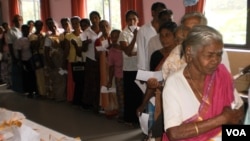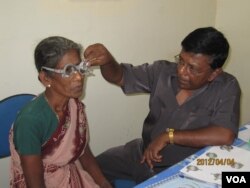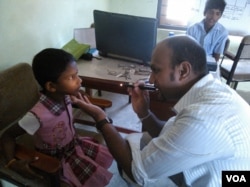Healthcare consultant Ashanthi Mathai was on an assignment in Sri Lanka four years ago, when she was asked to collect used eye glasses in the U.S. for a Sri Lankan program working to prevent blindness.
Mathai had come to the U.S. from Sri Lanka in the early 1990s for college. She went to Princeton to study chemical engineering and then to Stanford Business School, before starting her career in healthcare strategy consulting.
After researching the problem, she said it was clear that there was a great need for help. Many Sri Lankans have untreated vision problems because of the high cost of eye care services.
“In Sri Lanka, according to the latest income and expenditure survey in 2012, 50 percent of the population lives on less than one dollar, 28 cents a day on average,” she explained. “Eye glasses can cost typically about $50, $80, $100, making them largely unaffordable to a good majority of the population.”
Seeing a solution
Rather than recycle used glasses, Mathai set her sights on making new ones, after discovering that she could get custom-made eye glasses for just $6. Since she founded So Others May See in 2011, the non-profit, she noted proudly, "has assisted about 24,000 adults with eye exams and custom fitted eye glasses.”
SOMS also partners with Sri Lanka's Ministry of Health to provide free eye care for children. “Over the last three years we’ve been able to do lots of programs with their partnership,” said Dr. Asela Abeydeera, the Ministry's spokesperson.
One of those programs sends dozens of mobile clinics to schools across Sri Lanka to conduct vision screenings. For many of the 900,000 students who have been screened so far, the service has been a life changing experience.
“The children are very happy,” said Abeydeera. “They started to see the world again. And they’re able do their studies, reading, writing, [and doing] everything with ease. There is a lot of appreciation from students and their parents.”
Expanding its reach
SOMS began its work targeting the poorest communities. Mathai said there is still a need to do more to treat more complicated cases and prevent vision impairment. She’s planning to expand the service to another segment of the population.
“[We’re] exploring the opportunity to serve the lower-income segment of the population who are not very poor,” she explained, “but due to the high cost of living and other reasons, they kind of also struggle to purchase eye aids. We like to assist them with discounted but quality eye glass offering.”
Mathai has a unique understanding of the issue. She has used reading glasses since she was a child. But poor eyesight has only helped her focus more clearly on a vision of a world where everyone can see.








